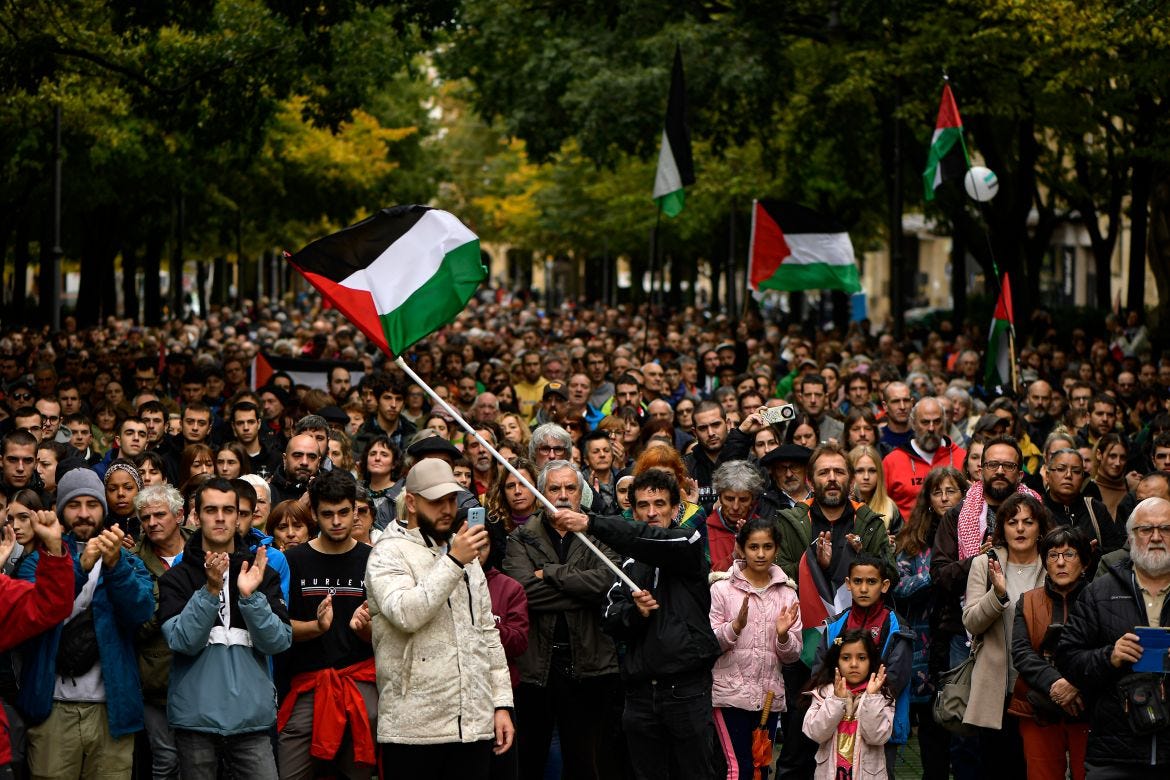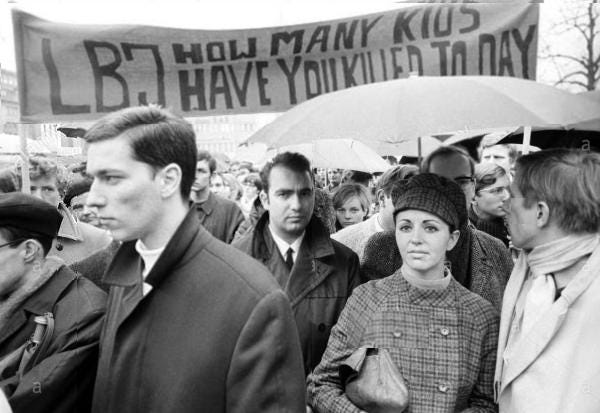Why We March
The point of protest
Last weekend I met up with some friends to watch the Super Bowl. As many conversations nowadays do, our pre-kickoff discussion turned to politics, specifically Israel-Palestine. One of my friends, who has different beliefs than me, mentioned that he thought the Chicago City Council resolution calling for a ceasefire in Palestine was pointless.
I can’t recall his exact words, but it was something along the lines of: “It’s not like Chicago controls foreign policy, so a ceasefire resolution is a waste of time.”
My friend is not alone in believing protests and seemingly symbolic gestures are unproductive. While frustration with political demonstrations is common no matter the subject, it’s become a common response to the growing movement demanding an end to Israel’s assault on Gaza.

Undoubtedly, some of the people deriding public acts supporting Palestine do so because they support Israel’s campaigns. But there are many others who, regardless of their political belief, don’t recognize the motive of political demonstration. Not through fault of their own, but because it’s never been properly explained to them.
The Point of Protest
On the surface, marching with placards reading “FREE PALESTINE” or passing a resolution condemning a foreign occupation may seem trivial. After all, neither Chicago Mayor Brandon Johnson nor a crowd in Las Angeles has direct control over American or Israeli foreign policy, so I understand why one might see these actions as little more than large-scale virtue signaling. But to believe this is to misunderstand the intention and goals of the people in the streets.
The point of protest, whether it’s a permitted march or an illegal disruption, is not to change the minds of the people in power. Joe Biden will not stop supporting Israel’s onslaught because Chicago City Council asked him to. He decided on the colonization of Palestine long ago, and no suggestion to change, even one from the Democratic bastion of Chicago, is going to sway him. But we’re not trying to change Joe Biden’s mind. The point of our protests is not the persuasion of our leaders, but a demonstration of the public’s appetite for revolt.
“Revolt” is a heavy term that conjures images of civil war and armed violence, but that is only one of its forms, and is by far the most extreme. The American Revolution was a revolt, but so is a vegetarian’s commitment not to eat meat. Protest is a manifestation of the people’s willingness to revolt against their leaders. That revolutionary willingness can bring societal change, such as the movements that toppled Tsarist Russia, Jim Crow segregation, and South African Apartheid. Or it can be more contained, such as the anti-war protests that undercut President Lyndon B. Johnson, forcing him not to run for reelection and eventually ending the American occupation of Vietnam. As history shows us, neither rulers nor revolters can predict how far down the spectrum their action will go, a cause of terror for the former and a source of inspiration for the latter.
Frederick Douglass accurately stated, “Power concedes nothing without a demand. It never has, and it never will.” Just as a king would never abdicate his throne willingly, the political class will not end its support for Israel’s conquest absent a demand from us, the people who give them their political legitimacy. When we march, chant, or undertake any other form of protest, we are stating that demand. But, demands only work if they are backed by a threat.
“This struggle may be a moral one, or it may be a physical one, and it may be both moral and physical, but it must be a struggle. Power concedes nothing without a demand. It never did and it never will.” - Frederick Douglass, August 3, 1857
Subordinate Power
While protestors have no direct power over the President of the United States, what they do have is subordinate power. All leaders, whether they are monarchs or democrats, derive their right to rule from the consent of the masses. In modern democratic systems, this consent is registered through the ballot box. In the monarchical governments of history, it was registered by the absence of armed revolution. To protest is to demand change, backed by the threat of delegitimizing the current ruler’s popular mandate. This is subordinate power — the ability of the masses to withhold themselves from a political structure, crumbling the entire apparatus. Think of it like a human pyramid. While the person at the top has the best view, those at the base have subordinate power. If their protests to the top are ignored, those at the base may revolt by fighting the higher-ups, removing themselves from the pyramid, or by becoming distracted, letting their muscles loosen and causing the pyramid to fall. The same is true with a political mandate. Absent public support, governments collapse: empires dissolve, Presidents are forced to resign, and prime ministers receive dreaded votes of no confidence.
Looking at the demographic makeup of pro-Palestine protestors and recognizing the extent of their subordinate power gives us a good idea of where this revolt will go. Throughout history, protests and strikes have catalyzed overthrows of kingdoms and governments, but that is unlikely in 21st-century America. Instead, the revolt stemming from the ceasefire cause will be more contained. As the bulk of participants come from the young, multi-racial, working-class base Democrats rely on to win elections, the revolt mindset that birthed this movement is a threat to Joe Biden’s reelection chances. As I explained to my friend, Chicago is a Democrat stronghold. While Illinois’ electoral college votes will still go to Biden, the President’s refusal to abide by the city’s call for a ceasefire will depress the financial resources and volunteer power Democrats receive from Illinois. That will impact their ability to campaign in swing states. Additionally, many Americans voted for Biden because they wanted domestic calm after the turbulent Trump years. That message, which Biden heavily emphasized in 2020, is undermined by mass marches in the streets and denouncements from his political allies.

If a leader chooses to ignore protests (as Biden is doing), the mounting public pressure softens the defense of allies and dissuades moderates from supporting them. The lack of allegiances imperils them whether their political future is decided upon the barricades or at the ballot box. When we look at history, protest has always been the opening bell in a fight between the people and their rulers. That fight is not always a full-fledged war, but it is a fight and fights have winners and losers.
As deposed kings and defeated presidents can tell Joe Biden, he ignores the growing protests for a ceasefire at his own peril.
Thanks for reading JoeWrote. Don’t forget to like, share, and, most importantly, subscribe.




This is an excellent summary of how the tactic of public protest is supposed to work. Or rather, how it used to.
This century, tho', there are many problems with it that cannot be handwaved away. Some of these are:
1. The overwhelming abundance of surveillance technology brought to bear on suitable public spaces, making them "data traps" for those who'd gather there;
2. The _extensive_ countermeasure "playbook" authorities have developed internationally over the past 60 years; in everything from the legal arena to specialized equipment to the tactical street-level space, to isolate and neutralize public gatherings;
3. The idea of "revolting" through public protest/demonstration is no longer an emotion-shaking event for most citizens of the modern world like it was for their ancestors of the conformist 1950s; today someone somewhere is literally *always* revolting against something, real or imagined, since the 1990s, and society in general is inured to the tactic anymore. Part of that is due to the idea that even certain ersatz, 'AstroTurf' actors have used the tactic pretty regularly over the past 20 years; so an average non-involved observer can't automatically assume that it's an anti-establishment movement out there on the street anymore.
Oh, and 4.
Public protests of any size have been known, in the age of social media, to massively attract various other opportunists; who will work actively to derail or besmirch the cause or side being rallied for; and bc they use attention-getting antics, they often win.
Too often, a public protest against the authorities, in fact, serves them more than anyone; it draws and gathers those who oppose them into a nice convenient area to be surveilled with face-recognition tech, have their phones pinged with IMSI- catchers, and should those authorities wish, to be brutalized and arrested by cops in and out of uniform.
This is the world we live in today. If we are going to effectively oppose our foes, official or unofficial, new tactics must be found to do it.
Sorry to be the fly in the soup here.
Well said, Joe. We Americans have been trained that “your resistance is futile” and “your actions are illegal or at best, ignored.” What we’re told is to vote, Vote, VOTE! Get Out The Vote. GOTV!! Every two or three years. And then our actual votes are stolen, gerrymandered, made illegal.
We must rediscover, reforge the class solidarity of our past that does not just rely on passively voting for the options given to us.